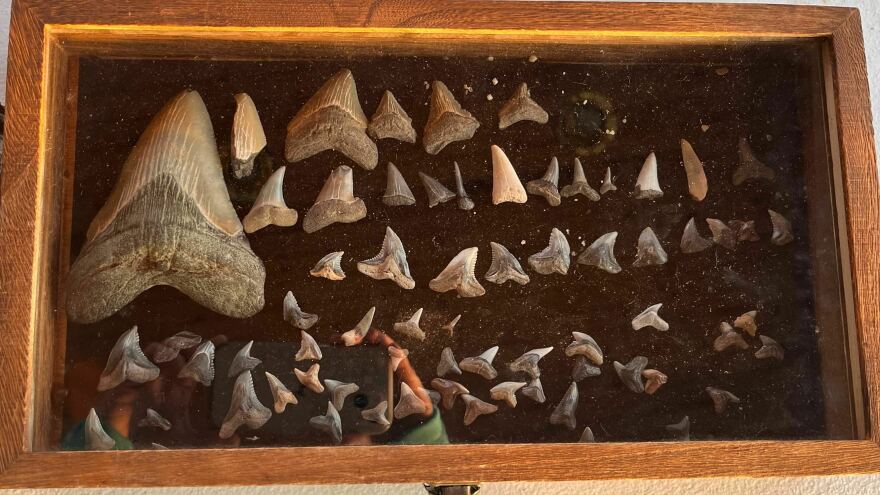Molly Sampson's favorite Christmas present was the one she went out and got for herself that morning: a 5-inch-long Otodus megalodon tooth from a shark that lived millions of years ago.
The 9-year-old Maryland girl and her older sister, Natalie, had asked for and received insulated waders and fossil sifters so they could go shark tooth hunting further out in the waters of the Chesapeake Bay near the Calvert Cliffs, recalls Molly's mother, Alicia Sampson.
They immediately put on their new waders and went out hunting with their dad, Bruce Sampson, in 10-degree weather around 9:30 a.m. It was low tide, meaning they could go out further to find fossils. Molly, who hopes to be a paleontologist when she grows up, announced matter-of-factly that she was going to look for a meg — a nickname for the massive shark from the Miocene Epoch. She's always wanted to find one.
Less than half an hour later, in knee-deep water, she looked out and saw something strange.
"I went closer, and in my head, I was like, 'Oh, my, that is the biggest tooth I've ever seen!'" Molly says excitedly during an interview Wednesday. "I reached in and grabbed it, and dad said I was shrieking."
Bruce has been fossil hunting since he was little and has taken his daughters since they were very young, too, Alicia says. He also dreams of finding giant teeth, but his largest find — about 3 inches — looks like a "baby tooth" compared to Molly's, Alicia says.

A little over a week after Molly's discovery, the family took the fossil to the Calvert Marine Museum in Solomons, Md., to confirm its identity.
Staff was busy disassembling a shark exhibit when they came in, says Stephen Godfrey, curator of paleontology at the museum and Molly's former science teacher at vacation Bible school.
It wasn't the first treasure the Sampsons had taken to him, but it was the biggest.
"It's a spectacular specimen," Godfrey says. "It's one of the larger ones that's probably ever been found along Calvert Cliffs" and might be a "once-in-a-lifetime kind of find."
While the Calvert Cliffs are famously fossil-producing, megalodon teeth this big are hard to come by, and there are none in the Calvert Marine Museum's collection over six inches.
The tooth came from the upper left jaw of a megalodon that was probably 45 to 50 feet long and lived about 15 million years ago, Godfrey says. The shark — a macropredator, meaning it can't swallow its prey whole — both scavenged and actively hunted whales and dolphins with its specialized, serrated teeth.
"It basically evolved those kinds of teeth so that it could cut out pieces, just like great white sharks do," Godfrey says. "They sort of chomp the carcass of their prey" rather than swallowing it whole.
Godfrey says he hopes the story of Molly's big find helps inspire other kids to take an interest in science and to explore the natural world.
And based on the emails her family has gotten so far, it seems to be doing just that, says her mom.
"It's kind of cool that she was motivating other kids to get outside and explore," Alicia says.
Molly has already been out fossil hunting again a few times since Christmas, adding to her collection of over 400 teeth, where the megalodon tooth remains. With her new waders, she's not stopping anytime soon.
Copyright 2023 NPR. To see more, visit https://www.npr.org.





